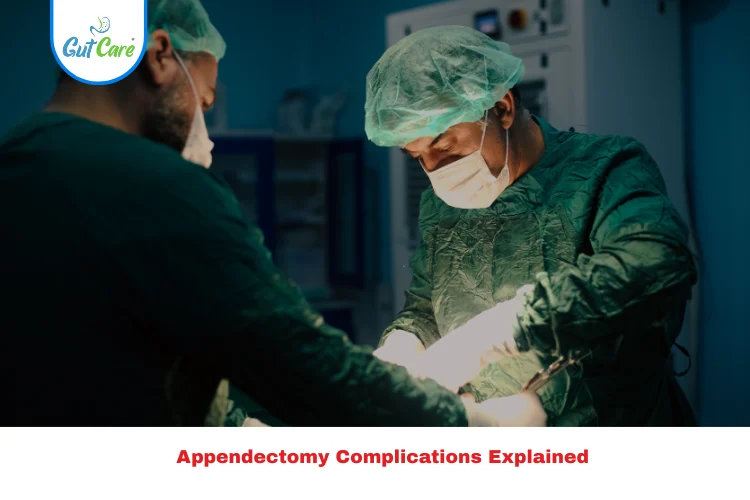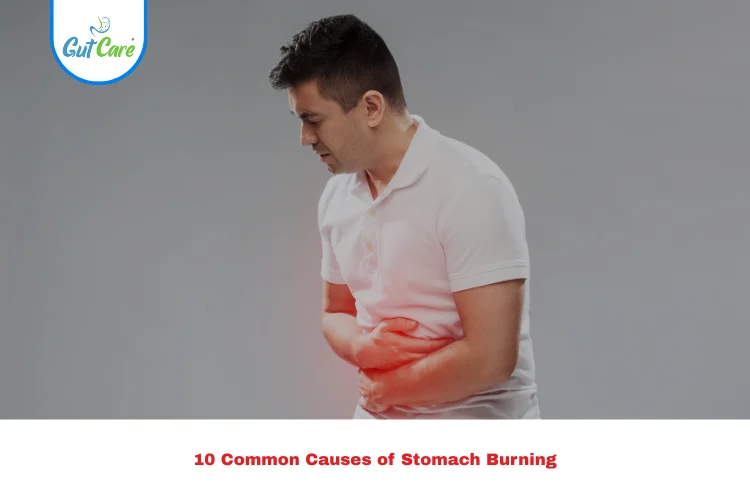An appendectomy can save your life—but knowing the potential appendectomy complications is just as important for your recovery. Most patients recover with no issues, but others experience some complications that require urgent treatment and medical follow-up.
At Gutcare Clinics, one of Bangalore’s leading digestive health centers, Gastroenterologist Dr. Yuvaraj Singh Gehlot emphasizes that patients should be informed about what could go wrong—not to worry them, but to empower them.
In this blog, we’ll break down the common appendectomy complications, home care tips, warning signs, and when to seek professional help. Whether you or a loved one recently had this surgery, this is the comprehensive recovery guide you need.
What Is an Appendectomy?
An appendectomy is surgery done to remove the appendix, typically performed for a diagnosis of appendicitis, an infection that causes inflammation and significant pain in the lower right abdomen. An appendectomy is usually a sudden and urgent procedure and is only performed for appendicitis. The appendix can be removed with surgery in 2 ways:
- Laparoscopic appendectomy – A minimally invasive procedure; small incisions; faster recovery time
- Open surgery – This method is chosen when the appendix has ruptured or the infection has spread.
While surgery will generally resolve the problem, complications from an appendectomy can arise during healing.
Top Appendectomy Complications You Should Know About
Top Appendectomy Complications You Should Know About
Let’s explore the most frequently reported complications after an appendectomy. Being able to recognize early warning signs can be the difference between a smooth recovery and a setback.
1. Surgical Site Infections (SSI)
This is a common complication of abdominal surgery-a bacteria infected wound.
Signs to be aware of:
- Redness or warmth around the incision
- Pus or yellowish drainage
- A fever greater than 100.4°F (38°C)
- Swelling or increased pain at any point near the site
Recommendations to limit infection:
1. Keep the wound clean and dry
2. Don’t touch the area when it’s not necessary
3. Follow your doctor’s instructions for any recommended wound care
If there is concern for infection, your gastroenterologist will usually give you a course of antibiotics.
2. Abdominal Abscess
If the appendix had burst prior to surgery, there is a risk of having an abscess form – an organized collection of pus that is trapped in the abdominal cavity.
Common symptoms include:
- Fever and chills
- Swelling or pain in the lower abdomen
- Feeling very tired or weak
- Nausea or loss of appetite
Your treatment may include antibiotics and possibly surgical drainage. If you still are concerned with your symptoms, you may see a clinic or specialist like Dr. Yuvaraj Singh Gehlot.
3. Bowel Obstruction
Scar tissue after surgery occasionally creates a blockage somewhere in the intestines that causes a mechanical bowel obstruction.
Symptoms of this complication may include:
- Inability to pass stool or gas
- Crampy abdominal
- Severe abdominal distention
- Vomiting
4. Internal Bleeding
Bleeding can rarely occur after surgery, but can happen especially in open procedures.
Symptoms of internal bleeding may include:
- Dizziness or faintness
- Rapid heart rate
- Pale skin
- blood in vomit or stool
5. Incisional Hernia
At times a surgical incision will fail to heal properly and the intestines may protrude through the abdominal wall, which is called hernia.
Signs of a hernia:
- A bulge can become visible and/or be felt around the incision site
- Pain with lifting or straining
- A dragging sensation in the abdomen
- Hernias usually require only minor corrective surgery.
Home Remedies to Support Post-Appendectomy Recovery
While serious appendectomy complications need medical treatment, minor discomfort can often be eased at home with safe and natural approaches.
Note: These remedies are for general well-being and do not replace medical treatment. Always consult your doctor first.
1. Warm Compress for Abdominal Discomfort
A warm compress can help relax abdominal muscles and reduce soreness.
- How to use: Use a hot water bottle wrapped in a towel, apply to the belly for 10–15 minutes.
- When to avoid: If you notice swelling, avoid applying heat directly—see a doctor instead.
2. Herbal Teas to Aid Digestion
After surgery, digestion may slow down. Herbal teas like peppermint or chamomile can support the gut.
- Benefits: Reduces gas, soothes intestinal muscles, promotes calmness
- Usage: 1–2 cups daily
- Precaution: Avoid if you’re allergic or taking blood thinners
3. High-Fiber Diet to Prevent Constipation
Constipation is a common side effect of anesthesia and painkillers post-surgery.
Include in your diet:
- Oats and whole grains
- Fresh fruits (papaya, guava, apples)
- Cooked leafy vegetables
Drink at least 2 liters of water daily to aid fiber movement.
4. Gentle Walking
Light movement helps prevent blood clots, keeps the digestive tract active, and improves circulation.
- Start slowly: A 5-10 minute walk twice a day can make a big difference
- Don’t overdo it: Avoid stairs and lifting heavy objects for at least 4 weeks
5. Turmeric Golden Milk
Turmeric has anti-inflammatory and healing properties that may help reduce internal inflammation.
- How to prepare: Add ½ teaspoon turmeric powder to warm milk. Drink before bedtime.
- Avoid if: You’re on anticoagulants or have kidney issues—ask your doctor first.
When Should You Call a Doctor?
Even with the best care, appendectomy complications can still happen. Seek immediate help if you experience:
- Fever that doesn’t go down
- Vomiting or severe nausea
- Pain that increases over time
- Pus or fluid leakage from the wound
- Inability to pass gas or stool for more than 2 days
For patients in Bangalore, Gutcare Clinics provides top-tier post-surgical care. Dr. Yuvaraj Singh Gehlot, a trusted name in gastroenterology, can help assess and manage complications effectively.
5 Essential Tips for a Safe Recovery
- Take prescribed medications on time
- Don’t skip follow-up appointments
- Eat soft, easy-to-digest foods
- Rest, but avoid complete inactivity
- Report any unusual symptoms immediately
Conclusion: Be Informed, Stay Safe
While an appendectomy is routine, appendectomy complications aren’t uncommon. Knowing what to expect, how to care for your body, and when to seek help makes a big difference in your recovery journey.
If you’re experiencing ongoing discomfort or signs of infection, don’t delay. Visit Gutcare Clinics in Bangalore and consult with Dr. Yuvaraj Singh Gehlot, one of the city’s most experienced gastroenterologists.
FAQs on Appendectomy Complications
1. What are the signs of complications after an appendectomy?
Fever, pus at the incision, abdominal pain, and vomiting may indicate appendectomy complications. If you notice any of these symptoms, consult a specialist.
2. How long does recovery take after an appendectomy?
Full recovery typically takes 2–4 weeks for laparoscopic surgery and up to 6 weeks for open surgery. Complications may delay healing.
3. Is it normal to have stomach pain weeks after surgery?
Mild soreness is normal. However, sharp or increasing pain could signal appendectomy complications like infection or hernia. See your gastroenterologist if pain persists.
4. Can Gutcare Clinics in Bangalore help with post-appendectomy issues?
Yes. Gutcare Clinics, led by Dr. Yuvaraj Singh Gehlot, offers specialized care for patients experiencing appendectomy complications in Bangalore.
5. What should I avoid after an appendectomy to prevent complications?
Avoid heavy lifting, junk food, smoking, and alcohol during recovery. Follow all medical advice to minimize the risk of appendectomy complications.




